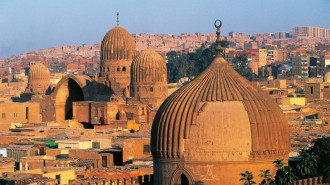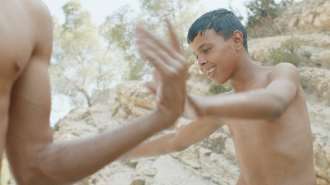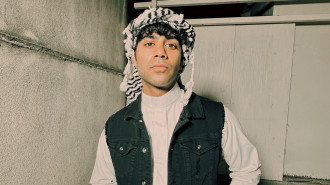
Israeli aggression leaves long-term mental health issues for Gaza’s children

The 11-day aggression on the coastal enclave may have ended, but the mental health consequences are still taking a heavy toll on Gaza's children – 66 children were killed during the 11-day aggression in May and at least 470 children were injured during the attack, including injuries that will result in permanent or long-term disabilities. For a child aged 14 or over, this recent escalation was the fourth aggression that they have lived through.
Saleh Humaid, a seven-year-old child from the Shujaeya neighbourhood, lost his right leg during the Israeli attack in Gaza. Ahmed Humaid, Saleh's father, told The New Arab that his son got injured when they were in the market during the last day of Ramadan with his two other brothers. "Suddenly, when we were in the middle of the market, a huge explosion occurred. Israeli warplanes started bombing us, and then I don't remember what happened next as I passed out.
"Minutes later, I woke up and found Saleh standing on one leg only; it was obvious why and his leg had to be amputated right away. He had also broken his hand," he continued. Saleh was transferred to Egypt for his hand, but his mental health situation has severely deteriorated since his injuries.
| Seven-year-old, Saleh Humaid from the Shujaeya neighbourhood [Mohammed Salem] |
At least 241 children have lost one or both parents. Six-year-old Suzy Ishkontana was rescued from under the rubbles after the Israeli raid, which killed her mother and four siblings. A video of her crying beside her mother's cemetery went viral online, highlighting the devastating plight many of these young children face.
Another child, 12-year-old Bara Suliman was filmed running after the dead bodies of his father, Saber, 39, and his brother, Muhammad, 16, who were being carried to the cemetery. He was seen crying and begging to be allowed to take a last look at them. When Baraa reached his father's body, carried on the shoulders of male mourners, he tried to touch it while addressing him, saying: "May God make it easy for you, daddy," which made the rest of the mourners cry.
For the first time, Palestinian children in Gaza Strip were involved in documenting the aggression they were facing on social media platforms. Children used Instagram and Tiktok to post pictures and videos of the violence they witnessed.
Sama Ahel, 15, narrated how she and her family evacuated their house when Israeli warplanes bombed the Al Sousi building, expressing that it is not fair that she experienced such violence as a Palestinian child. "I documented everything because I thought I was going to die; I wanted the world to see how we were killed. People think Israel warns people before they bomb us, but no, it was not true.
"I’m a child; I'm not supposed to hear these huge explosions, see the death in my own eyes. My dream is not a new toy; my dream is this occupation to end and become a famous programmer and designer I am only 15 and I experienced four violent aggressions that occupy our memories and dreams."
Ismael Ahel, Sama's father and a psychiatrist, told The New Arab that children in Gaza documented the violence and killings instead of enjoying their childhood. "My daughter was one the children who documented the recent 11-day aggression on social media to spread the truth to the world and to show what Palestinian children were going through."
Ahel believed that the latest attack was different because it was very harsh on Palestinian families and their houses. "The Israelis bombed agriculture, buildings, and humans during the last attack. The Israelis wrecked the Palestinians, financially and psychologically.
"My seven children were in danger. The Israeli's were targeting children, women, and even those with disabilities. They also went for areas that have always been known as 'safe.'"
"My son Salam does not stop talking about the zombies (Israel); he talks about how he is scared they might come and kill him or his baby sister," Asia Mathkour told The New Arab.
Asia, a mother of two living north of the Gaza Strip, said that her son stopped liking or wanting to sleep in his own room because he is scared.
"Even when he plays, he makes up a story of how Israeli's will shoot us," she explained.
Parents mentioned their children suffer from nightmares, are wetting the bed, have a low academic achievement and have also witnessed a change in their appetite, with many now choosing to stay in isolation.
Dr Bahzad Al Akhras, MSc Child and Adolescent Mental Health Psychologist at the Gaza Mental Health programme, told The New Arab, "There is a collective impact on the continuous aggressions Gaza is witnessing, including domestic violence, aggressiveness." He further explained how many people in Gaza were now experiencing Continoutuos Traumatic Disorder (CTSD), "which is more critical than PTSD," he added.
After every aggression, mental health specialists believe that the Israeli occupation wipes all their efforts to treat traumatic disorders, as children witness more violent and more extreme events, it forces them to start from scratch.
"Children in Gaza are also undergoing hypervigilance, a state of increased alertness where you re extremely sensitive to your surroundings," Dr Al Akhras explained. Such a situation leads to poor concentration, high-stress and exhaustion, meaning children can no longer enjoy their daily lives.
"Children are vulnerable. They do not have the mechanisms that adults have to cope with the difficulties they are going through. A four or five-year-old does not understand the political conflict Palestine is going through yet."
Research by Save the Children after the 50-day attack in 2014 revealed that after a year, seven out of ten children in the worst-hit areas in Gaza were still suffering from nightmares, and 75 percent were still bedwetting regularly. Up to 89 percent of parents reported that their children were consistently afraid. Research in 2019 after the escalation in 2018 found similar results.
Following the recent escalation, Euro-Med Monitor found that about 91.4 percent of children in Gaza were now suffering from some form of conflict-related trauma.
Hind Khoudary is a Palestinian journalist working as the MENA Editor in Misbar and a member of The Marie Colvin Journalists' Network
Follow her on Twitter: @Hind_Gaza








